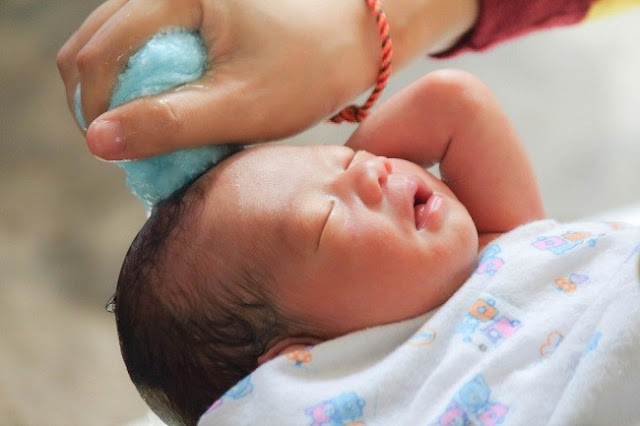
The presence of your child would make life more meaningful. Unfortunately there are still things about the care of your child who are still not used to the new mothers, one of which is how to bathe your child.
Bathing your child becomes a crucial moment considering that at the age of 0-3 months, the baby's skin is still vulnerable to irritation and peeling so special treatment is needed. Not infrequently, some mothers deliberately do not bathe their little ones for several days for reasons not yet. In fact, in the opinion of the doctors, Mother was allowed to bathe their little ones since being taken home from the hospital.
Mother is also often confused about the right temperature for your child. The recommended water temperature is lukewarm alias not too hot and not too cold. Usually, the temperature that is considered safe is around 37-38 degrees Celsius. If there is no thermometer, it's better to use your elbows instead of your palm to measure.
One of the things that must be considered in bathing your child is to prevent your baby from swallowing bath water. If that happens, your child will likely experience gastroenteritis or diarrhea because they are vulnerable to bacteria and viruses. To prevent this, dip your baby in a water bath slowly.
Then, ideally how many times can your child take a shower? For newborns, bathing 2-3 times a week is enough. Mother can also bathe your child every day, especially if the baby always enjoys these moments. But Mother also must pay attention to the quality of water used. If the water quality is not too good, then bathing your child too often just does not give goodness to their skin.
Bathing Your Child Who Has Special Conditions
Some of the conditions below often make you feel worried when you have to bathe your child.
The belly button hasn't knotted yet
How to bathe your baby has not broken the navel cord that is safe is to use a sponge or a small towel washed with warm water. Rub gently throughout the baby's entire body evenly. Give more attention to the fold area under the arm, around the neck, behind the ears, and pubic area.
Remember, the umbilical cord must be kept dry and sterile. Just clean it with and dry it with a soft towel or fan it with a piece of paper. Position your baby's diaper so as not to break the umbilical cord. Let the umbilical cord fall on its own. Usually this process takes about 1-3 weeks.
There are some signs of infection in the umbilical cord that should be considered seriously by the Mother. The signs are redness, swelling, the baby cries when the umbilical cord is pressed, smells unusual, festering, and followed by fever. If this happens, then your child should be taken to the doctor.
The head is still soft
Another condition that often makes Mother afraid of bathing your child is when the baby's head is still soft. In fact, how to bathe your child with this condition is not complicated. Simply wiping it slowly with shampoo specially formulated with soap. If your child already has hair, then your baby shampoo can be used.
Chicken pox
Despite experiencing chicken pox, your child must still be bathed to maintain cleanliness so that your child feels comfortable. How to bathe your child who has chickenpox also must be done carefully. The purpose of this caution is so that the chicken pox does not break. This should be done because broken chicken pox usually will leave scars on your child.
Flu and fever
Your child who has a cold may still be bathed in water that is not too cold. In your child who has a fever up to 40 degrees Celsius, can be bathed by wiping using a sponge soaked in warm water. A warm bath can also be done because warm temperatures may reduce the fever.
Fear of taking a shower
Children who are scared when bathing are common, although this cannot be explained. This fear will end with age. To overcome this, Mother can try bathing with your child. Another way is to bring toys while bathing, change the tub, massage your baby while bathing, and change the bathing ritual to make it fun.
Too morning or night
Not a few mothers who think bathing in the morning or night can invite asthma and pneumonia. In fact, this is not related to one another. The cause of pneumonia itself is an infection caused by microorganisms such as bacteria, viruses and fungi. While asthma is caused by excessive immune reactions to various irritants. Experts suspect that there is a strong link between allergies and asthma.
Dry skin
Dry skin that occurs in your child is usually caused by bathing for too long. Soap containing antiseptics should also be avoided. A child expert recommends to shorten bath time and use unscented soap to keep the little one's skin moist.
Can you use your baby care products?
In addition to understanding how to bathe your child is good, the use of baby care products can also determine their health. Baby care products may be given as long as they are not excessive in the amount of gift.
Baby care products are generally in the form of soap, shampoo, baby oil and powder. To ensure the safety of these products, be sure to read the product label carefully. Choose products that are safe for your baby's skin and avoid those that cause allergies. In addition, try to use products that are free of parabens and phthalates because these compounds can harm your child. If your child has sensitive skin, you should consult the use of products with a pediatrician.




Komentar
Posting Komentar